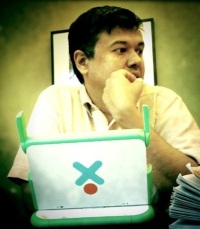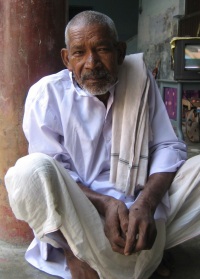I've lost count of how many times the demise of OLPC and Sugar has been proclaimed and celebrated. Just today, I ran into someone in the parking lot, who looked at my XO, and said "Didn't the founder of that project ditch and disappear?". News travels fast, no matter where it comes from, and no matter how wrong it is. I stand amused :-)
What makes this project continue to tick? Who are these people who refuse to give up? Why do these projects still survive? Grow even? I ask myself this question every few weeks, when I get burned out, wondering why I still hang on to this project and this funny green machine.

Sameer Verma and his XO
For my own personal journey with OLPC, Sugar and all things related, it's been an interesting experience. I'm a techie at heart. A "thinly-disguised" business school professor, as I sometimes admit to. I teach IT strategy, research business models and consumer behavior, but every once in a while, I'll sit down and compile a kernel, or run a packet sniffer. What can I say? It's instant gratification and a lot more fun :-) So, let's look at this as a supply and demand scenario.
The XO makes for a great technology platform. The mesh (802.11s or ad-hoc), suspend with the screen lit, robust, low power, etc. is all very cool. Cool enough for a grown man to walk around with a funny-looking green machine slung around his shoulder. The software stack is amazing, flexible, free. The content is rich. Wikipedia in a box? Awesome! The tech definitely keeps me tethered. I think of this as the supply side of the equation.
Then there's another side to my experience. A part of my family lives in rural India. Bhagmalpur, to be exact. A village where I have seen the simple life. Clean air, good food, quiet living. It's also poverty-stricken, with sanitation issues, water shortages, and a seriously untapped ingenuity. As a kid, I used to hang around Maggu while he milked a water buffalo, or Bahadur, while he made gold jewelry on a block of coal. Now I wonder what Maggu would do if he could learn about the rest of the world and its dairy achievements. How Bahadur's family could save the lost art of rural goldsmiths. Would they benefit from a peek into that Wikipedia in a box? You bet. This is the demand side.
So, in my mind, I have the rare experience of what the supply can be, and what it can do for the demand side. I speak with my friend Javier Cardona about IEEE 802.11s, all the while keeping Maggu back in my mind. The two worlds must meet. Then there's the catalyst. My daughter, Mira, who is five now. She could open the XO and power it on, turn it around into tablet mode when she was 2. At three years of age, she could play Implode on the XO with a certain finesse that amazed me. She has been my catalyst. Her curiosity and ingenuity never ceases to amaze me. Children are like sponges; they soak up everything. They also have incredibly simple solutions in their heads, because they aren't bogged down by all the crud we deal with as grown-ups. Cherish them.

My Compi - Mira Verma
So, there it is. The supply, the demand, and the catalyst. That's my story and I want it to work some day. I am sure every volunteer has her own story. Many come and go, some stay, but all leave a mark on the overall process. They all help us steer projects in new and meaningful ways. A little over two years ago in Austin the http://laptop.org/manual was written by volunteers to pave the way for a new kind of global user -- Sugar hackers and tech writers of all flavors, funded their own way to gather and create a resource that is used by all.
A year later, volunteers ganged up again in Washington DC (on their own dime) to create 30+ OLPC community deployment success stories, compiled into this growing repository of tips & tricks I've myself dipped into this pool and got my students to convert some of these into one pagers (We used Scribus to keep the content and the method totally free). If you need a one pager for a neighbor, or a school principal, grab this and print it!
This movement continues on thin budgets and a go-getter attitude. I'm sure some of it is ego, some reputation (as research shows), but a majority of it is a strong drive to make a difference. Every time I listen to John Lennon's "Imagine" (...imagine there's no countries...) I wonder...if you erase those lines in the sand, all those problems around the world indeed become yours as well. So should the solutions. Help solve it, and things will get better for everyone. "...and the world will live as one".
I've had the good fortune of working with a team of learning/curriculum experts at the University of the West Indies, and 115 XO-1.5 we've acquired. We are working with other deployments to seed far greater things OLPC in Jamaica, with our community learning portfolio at the ready. I am fortunate to have go-getter colleagues in Jamaica, who have plugged away since 2007 to get this off the ground.

Maggu in Bhagmalpur
Remember Realness? May's event in the US Virgin Islands -- where dozens of volunteers flew in to exchange notes, talk turkey, compile failures, and build rigorous community infrastructure. We are bringing home a new maturity and vigor around grassroots OLPC deployments on every continent (still working on Antarctica...anyone want to take an XO there?), towards anchoring OLPC successes and sustainability.
In about three weeks time, we're expanding this learning menu with the OLPC Community Summit. A stunning set of volunteers have helped us put together OLPC's biggest ever grassroots/community summit. Also thanks to our hosts (and my employer), College of Business at San Francisco State University and their downtown campus:
Who's coming? Take a look. Leading OLPC communities worldwide into spare parts logistics, learning content, direct Sugar/Gnome School Server applicability, highly progressive health activities, and even peripherals/solar/energy innovation teams.
Individuals like Daniel Drake literally paving the way for the world's largest OLPC deployments, collecting airfare donations in $10 chunks. Tabitha Roder, fostering OLPC's testing for years with the force of her personality in cafes across New Zealand.
We have preliminary RSVP's from Uruguay, Peru, Paraguay, Argentina, Nicaragua, Nepal, Afghanistan, Pakistan, India, Philippines, The Gambia, Rwanda, Sao Tome & Principe, France, UK, Italy, Belgium, Austria, Canada, Jamaica, Haiti, Birmingham and beyond.
So, come one, come all, come to San Francisco! Together we will build effectiveness around the many individual schools our SF community has fostered, from Madagascar to India. More importantly, you will help answer the question: what does this world deserve from its children?
Some are coming for Thai food, some are coming for IPA. Many are coming for dialogue, discussion, arguments, disagreements, ideas, and solutions. Bring meaningful and participatory education to millions. Stand up and make your mark! For those who cannot.
Sameer Verma is the chief organizer of OLPC SF community. He is also Associate Professor of Information Systems in the College of Business at San Francisco State University.

